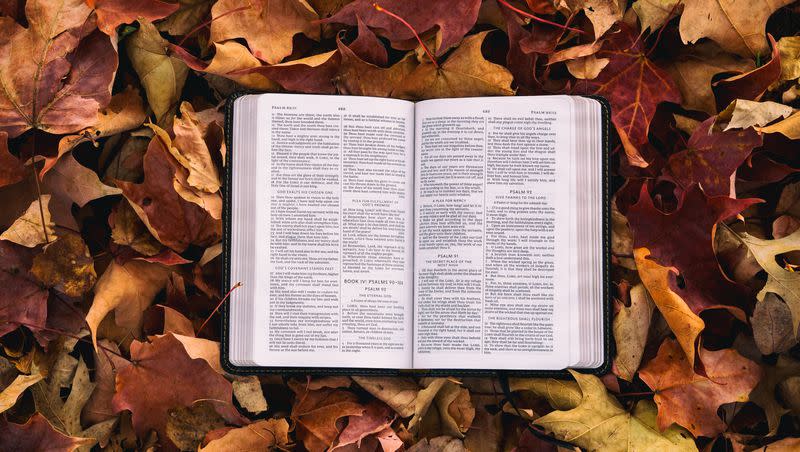What does Jesus say about apostles and prophets?

- Oops!Something went wrong.Please try again later.
The first time the word “prophet” is used in the Bible is when God tells Abimelech in a dream to return Sarah to Abraham in Genesis 20:7.
God says, “Now, therefore, restore the man his wife; for he is a prophet, and he shall pray for thee, and thou shalt live: and if thou restore her not, know thou that thou shalt surely die, thou, and all that are thine.”
This verse set the stage for the role of prophets, and eventually apostles, through the Old and New testaments, as being close to God and having heavenly power.
Related
What is the role of prophets and apostles?
In Ephesians 2: 20-22, apostles and prophets were called the “foundation,” while Jesus Christ was referred to as “the chief cornerstone.”
Two chapters later in Ephesians 4: 11-12, the Bible explains that these roles were to work at “perfecting the saints, for the work of the ministry” and “for the edifying of the body of Christ.”
What is the difference between a prophet and an apostle?
Like Christ, prophets receive revelation from God and point people towards salvation. They are usually seen as leaders.
Prophets have long been called mouthpieces for God. In Ezekial 3:27, God told Ezekial, “When I speak with thee, I will open thy mouth, and thou shalt say unto them, Thus saith the Lord God.”
The Twelve Apostles, the disciples of Christ, ministered and taught with him during his time on the earth. The main role of apostles is to be messengers of the gospel to the world.
Christ told his apostles to “proclaim as you go.” He instructed them to “heal the sick, raise the dead, cleanse lepers,” and “cast out demons” in Matthew 10: 7-8.
In Acts 1:8, Christ told the apostles that they would be “witnesses” of him “in Jerusalem, and in all Judaea, and in Samaria, and unto the uttermost part of the earth.”
Who are the 5 main prophets in the Bible?
Depending on one’s definition of a prophet, the number of prophets in the Bible varies from 23 to 88. There are five prophets that are well-known and spoken of often.
1. Moses is a central figure in the Old Testament. He was saved by his sister and mother when he was floating down the river in a basket in Exodus 2: 10. He was a righteous leader and led the Israelites out of slavery in Egypt by parting the Red Sea. He also received the Ten Commandments on Mount Sinai.
2. Elijah is well-known for his ascension into heaven by “a whirlwind” in 2 Kings 2: 11 of the Old Testament. He was a powerful prophet who used God’s power to multiply flour and oil for a widow (1 Kings 17:14-16) and returned the people of Israel to righteousness after they worshipped a false god called Baal (1 Kings 18).
3. Isaiah’s writings in the Old Testament prophesied the coming of Jesus Christ the Messiah. Because of these prophecies, Isaiah is often called the ”Messianic Prophet.”
4. Jeremiah was told by God that he was preordained to be a “prophet unto the nations” in Jeremiah 1:4. He is often referred to as the “Weeping Prophet” because of the many lamentations he wrote about the exile of the Israelites and the destruction of the city of Jerusalem.
5. Ezekiel’s stories in the Bible includes a firsthand account of being a Jewish captive of King Nebuchadnezzar and carried to Babylon. He was a priest and prophet who preached to a sinful people while writing visions and prophecies about the reunification of Israel.
Who is the first female prophetess in the Bible?
Miriam is the first female prophetess mentioned in the Bible in Exodus 15:20-21.
Related
What does the bible say about prophets after Jesus?
The Bible includes no specific reference to the possibility of a prophet coming after Christ was crucified.
Some have interpreted Hebrews 1: 1-2 to mean there won’t be a prophet after Christ.
But Christ himself said in Matthew 5: 17-18, ”Think not that I am come to destroy the law, or the prophets: I am not come to destroy, but to fulfill. For verily I say unto you, Till heaven and earth pass, one jot or one tittle shall in no wise pass from the law, til all be fulfilled.”
The Bible set up a standard of God’s use of prophets early on. Verses like Amos 3:7 and Luke 1:70 speak about the need for God to have a mouthpiece on earth “since the world began.”
Related

